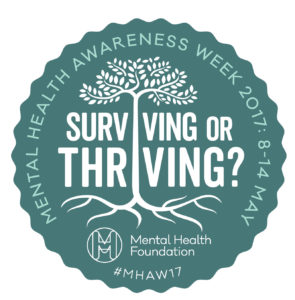
#MHAW17
This year’s theme is called Surviving or Thriving – men talk mental health. Rather than ask why so many people are living with mental health problems, the mental health foundation are seeking to uncover why too few of us are thriving with good mental health – in fact only 13% of those asked experienced positive mental health on a regular basis.
Since Prince Harry came out and spoke about how he had recently received counselling I have seen a marked increase in male clients. Usually I see one or two, but last week 50% of my clients were men ages ranging from 17 to 62. Their problems were diverse, bereavement, sports, exam stress, general anxiety and phobias, they came from different backgrounds, schoolboys, self employed business men, a builder, an IT engineer and someone on benefits trying to overcome serious head trauma. All were surviving but as the majority of them were at the beginning of their journey none were yet thriving.
The self employed businessman had made the connection between his panic attacks and how so much responsibility his family were placing upon him and how little his grown children were doing for themselves. The builder realised that all the commuting he was doing was causing him to panic and felt depressed that he lacked control over his environment. The schoolboys were not just stressed about their exams coming up, but also the amount of pressure their parents were placing upon them to get good results first time round.
The research shows that the over 55’s are the group that are coping best, perhaps that’s just down to life’s experiences or it could be that modern life with all it’s being in the limelight with social media and having expectations which put a lot of pressure on youngsters – especially the education system. Those of us growing up before the technological age really took off seem to not care quite so much about being perfect.
There is also evidence that those from poorer backgrounds tend to have poorer mental health, it’s not that money makes you happy, but it’s much more likely those from better income areas have better education, which in turn leads to better jobs, higher earnings and more control over what they can do, and what they want to do. The lower income bracket are more likely to smoke, which is a well known depressant over time, and to eat more cheap junk food, which has an effect on the gut flora, which can lead to feelings of panic and anxiety.
66% of those interviewed said they have at some time in life have had mental health problems, but this can be also be how we interpret problems. Phobias for example are classed as a mental health problem, but the majority of those who have them live with them without feeling the need to change them. Those living alone are also more likely to experience depression, and the older we are the more we take it upon ourselves to seek out activities that allow us to interact more. When I first became a therapist I found it very lonely compared when I worked in an office, so I joined an art class and a networking lunch group to allow myself the opportunity to mix with other people.
Other ways we can improve our mental health is to exercise, just walking 40 minutes every day can help boost dopamine and serotonin levels (the neurochemicals which help us be motivated and be happy), which can help our moods. Getting a decent night’s sleep will help our coping mechanism, as REM sleep helps us empty our stress buckets. Eating fresh fruit and vegetables and cut back on junk food will help your gut flora and in turn increase your serotonin production. Find an activity that allows you to mingle with people, such as art classes, dance classes, writing groups, pub quizzes etc.
If you want to find out more how you’re doing then go to:
https://www.mentalhealth.org.uk/your-mental-health/good-mental-health-survey
